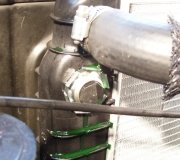My first suspect would be a bad thermostat. Next would be a radiator cap or head gasket. Both can cause overheating and both could be from the earlier overheat issue that caused a failed radiator.
Two tests would show which it likely is. One is a cooling system pressure test. It pressurizes the cooling system to the pressure indicated on the radiator cap. Then you watch to see if it holds at that pressure or not. Being it is a sealed system, it should hold pressure basically forever. If it does not and there are no external leaks like the radiator, water pump, heater core or hoses, the only other option is internal leakage in the engine.
You can easily do this test yourself if you wish. The testing kits are available at many parts stores in the US as a "loaner tool" (basically they make you buy the tool, then when you return it in the same shape you get the money back)
https://www.2carpros.com/articles/radiator-pressure-test
Run the test on a cold engine and you can add a simple step that may point out a bad head gasket as well if it does not hold pressure. That would be to run the pressure test. If it holds great, it is likely to be the thermostat.
If it does not hold pressure. Leave the tester connected and have someone start the car while you watch the pressure gauge. If the gauge bounces while the engine is turning over and then starts rising rapidly when it starts, shut it off. Remove the tester and plan on a head gasket replacement. The reason for that is the cooling system pressures should rise slowly from the coolant expanding. If the pressure bounces or rises real fast it is combustion gas pressure which should not be in the cooling system.
Thursday, October 5th, 2017 AT 9:56 PM


